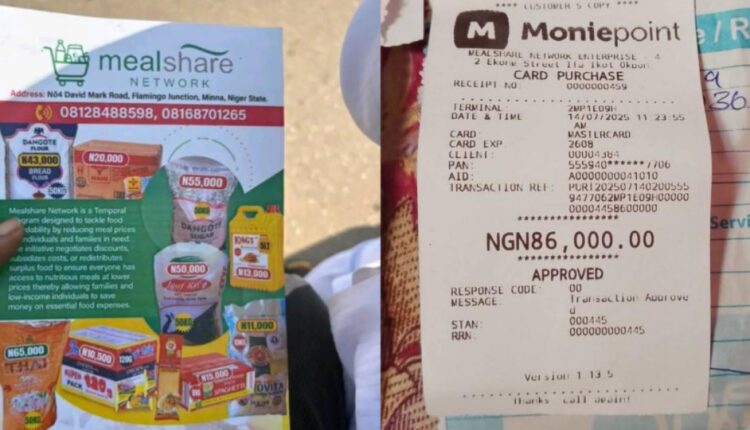… As Mealshare Network vanishes with millions of Naira
Joseph irikefe
Residents of Flamingo in Maitumbi area of Minna in Niger State have accused a company, ‘Mealshare Network’, of defrauding over 100 people in a suspected Ponzi scheme disguised as a subsidised food distribution programme.
Advocacy Times gathered that the company had convinced residents to make payments ranging from N58,000 to N86,000 in exchange for food items, including rice, beans, spaghetti, noodles, cooking oil, and spices; but just days later, the shop was locked up, and both the company operators and some local staff vanished overnight.
A resident who paid N58, 000 said: “I put my money into it hoping to collect rice, beans, spaghetti, cooking oil and spices. I invested because some youths in the community were staff of the company, and that gave me courage. Now, we can’t even find the youths or the owners.”
Another victim who paid N86, 000 shared her frustration, saying: “I took the risk because I saw some women benefiting from the company. But now, I regret it. It’s hunger, hardship and poverty that made me do it.”
A promotional flyer from the company stated: “Mealshare Network is a Temporal gram designed to tackle food affordability by reducing meal prices for individuals and families in need. The initiative negotiates discounts, subsidizes costs, or redistributes surplus food to ensure everyone has access to nutritious meals at lower prices thereby allowing families and low-income individuals to save money on essential food expenses.”
Residents said that many people in the community had made cash or bank transfer payments in anticipation of receiving the promised items, only to wake up on Tuesday and discover that the outlet had been shut down and emptied.
Efforts by the defrauded members to contact the company were unsuccessful, as the phone number printed on the receipt was found to be fake.
Confirming the incident, Police Public Relations Officer for Niger State Command, DSP Wasiu Abiodun, said: “On 16th July, 2025 at about 3pm, a report was received from Maitumbi Division that within the month of June and July, 2025, some persons reported at the Division that they entrusted some money to a group of people, whose identities are yet to be established, for advertising some foodstuffs to them at a subsidized rates from an unknown NGO.”
“They stated further that the items paid for have not been supplied to them, and money paid were not refunded, while the said group have absconded from the community,” he added.
“The total number of victims involved is yet to be ascertained, while investigation is ongoing and effort to arrest the perpetrators is being intensified.”
One can draw comparisons between the Mealshare Network fraud and two of Nigeria’s most infamous Ponzi schemes: CBEX and MMM Nigeria.
CryptoBridge Exchange (CBEX), Nigeria’s latest digital scam, promised investors up to 100 per cent monthly returns through AI-powered crypto trading.
It lured millions of Nigerians, many of them young and economically vulnerable, before collapsing in April 2025, wiping out over ₦1.3 trillion in savings.
Victims were encouraged to recruit others, and some were asked to pay “verification fees” to unlock their frozen accounts.
The Senate launched a national investigation, calling it one of the worst financial scams in Nigerian history.
The Economic and Financial Crimes Commission (EFCC) confirmed arrests and partial fund recovery, but many victims remain uncompensated.
“Families are ruined. Lives have been lost. We must act swiftly and decisively,” said Senate President Godswill Akpabio.
Also, MMM Nigeria, launched in 2015, promised 30% monthly returns via a peer-to-peer “help” model.
It attracted over three million Nigerians before crashing in December 2016, causing an estimated ₦18 billion in losses.
The scheme spread rapidly through WhatsApp groups, churches, and social media influencers, creating a false sense of community and legitimacy.
Its collapse led to suicides, family breakdowns, and long-term financial trauma.
Mealshare Network is part of a recurring pattern of exploitation, where scammers prey on poverty, desperation, and trust.
.


